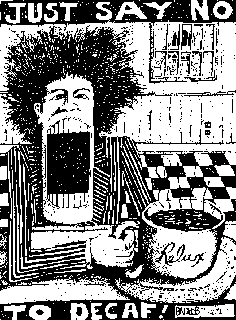Wednesday, May 14, 2008
Caffeine? it's everywhere!

Caffeine is highly addictive. Quitting coffee can cause withdrawal symptoms such as headaches, sleepiness and irritability. The acidic nature of coffee can lead to stomach ulcers. When the excess acid enters the bloodstream, it also increases calcium loss in urine. Both coffee and tea have no nutritional value. Tannin, the substance that makes tea cups brown and coats tea pots, is used for tanning leather. Imagine the stomach after twenty years of tea drinking.
Coca Cola put cocaine in their drink at the turn of the century. It sold extremely well. Some consumers succumbed to the addictive quality of cocaine and started to drink undiluted Cola syrup. When cocaine was banned for use in soft drink the bottlers switched to caffeine. The top selling soft drinks are loaded with caffeine: Coca Cola, 62 mg; Mountain Dew, 49 mg; and TAB, 45 mg. Similarly, instant coffee contains 66 mg per cup.
On those warm summer days, young children can drink large amounts of caffeinated pop. Children with half the adult weight and three times the sensitivity. One can of cola for them is equivalent to 3 cups of instant coffee for an adult. Caffeine, combined with sugar, salt, and a diet high in synthetic food, creates one unmanageable youngster.
Caffeine is also be found in cold remedies, diet pills, wake-up pills, chocolate, and pain killers. Over the counter and prescription pain killers will add to your caffeine quota: Excedrin, 65 mg; Midol, 32 mg; Anacin, 32 mg; Darvon Compound, 32 mg; and Fiorinal, 32 mg. Instead of healing the cold, caffeine slows down the elimination of mucus and destroys vitamin C.
In a survey, the four top reasons for people quitting coffee were: central nervous system disorders, 39%; gastrointestinal problems, 37%; to break the addiction, 19%; and fibrocystic breast tumors, 15%.
Monkeys are sensitive creatures. During the Boer War, the enemies of the British often poisoned their food supplies. Soldiers used monkeys to test the food. They chose what to eat by holding the food to their lower jaw and if the food was poisoned, the monkey would throw it away. A natural health practitioner, fascinated by the account, decided to test baboons to see if they had a similar ability. An apple was injected with strong coffee by a hypodermic needle. Two apples were given, the untouched apple was eaten hungrily by one baboon, a second baboon received the injected apple. He held it to his jaw, let out an angry screeching sound then tried to attack the experimenter. When he was given a good apple he went off to the corner and ate happily.
Caffeine is able to penetrate deep into vital tissue. Evidence shows that it may be linked to male infertility and also birth defects by passing through the placenta. Drinking coffee during breast feeding will cause caffeine to be present in mothers' milk.
Caffeine has a powerful effect on coronary arteries and the pulmonary and systemic vessels, causing a greater flow of blood to the heart muscle, but decreasing the flow of blood to the brain by constricting cerebral blood vessels. Caffeine can cause abnormally fast, abnormally slow and irregular heart beats. It also wreaks havoc on blood pressure, commonly producing hypertension. Coffee has been linked to heart disease, pancreas and bladder cancer, and hypoglycemia.
Caffeine is a central nervous system stimulant, providing that familiar kick on which we have come to depend. But as with all stimulants, there is a price to be paid. If you run the body on overdrive for an extended period of time by artificially stimulating the adrenals, expect breakdown to occur.
sOuRcE : http://www.freedomyou.com/addiction/caffeine%20addiction.htm
Labels: caffeine addict coffee effects bad good cola soft drinks pills chocolate article



0 Comments:
Post a Comment
<< Home